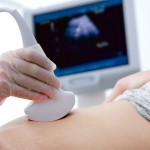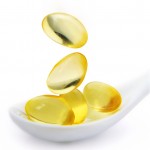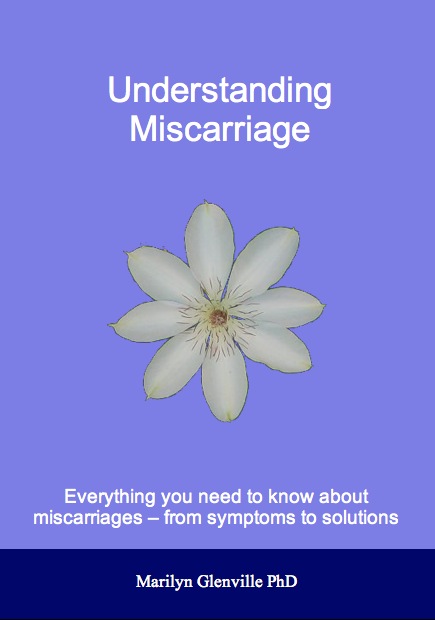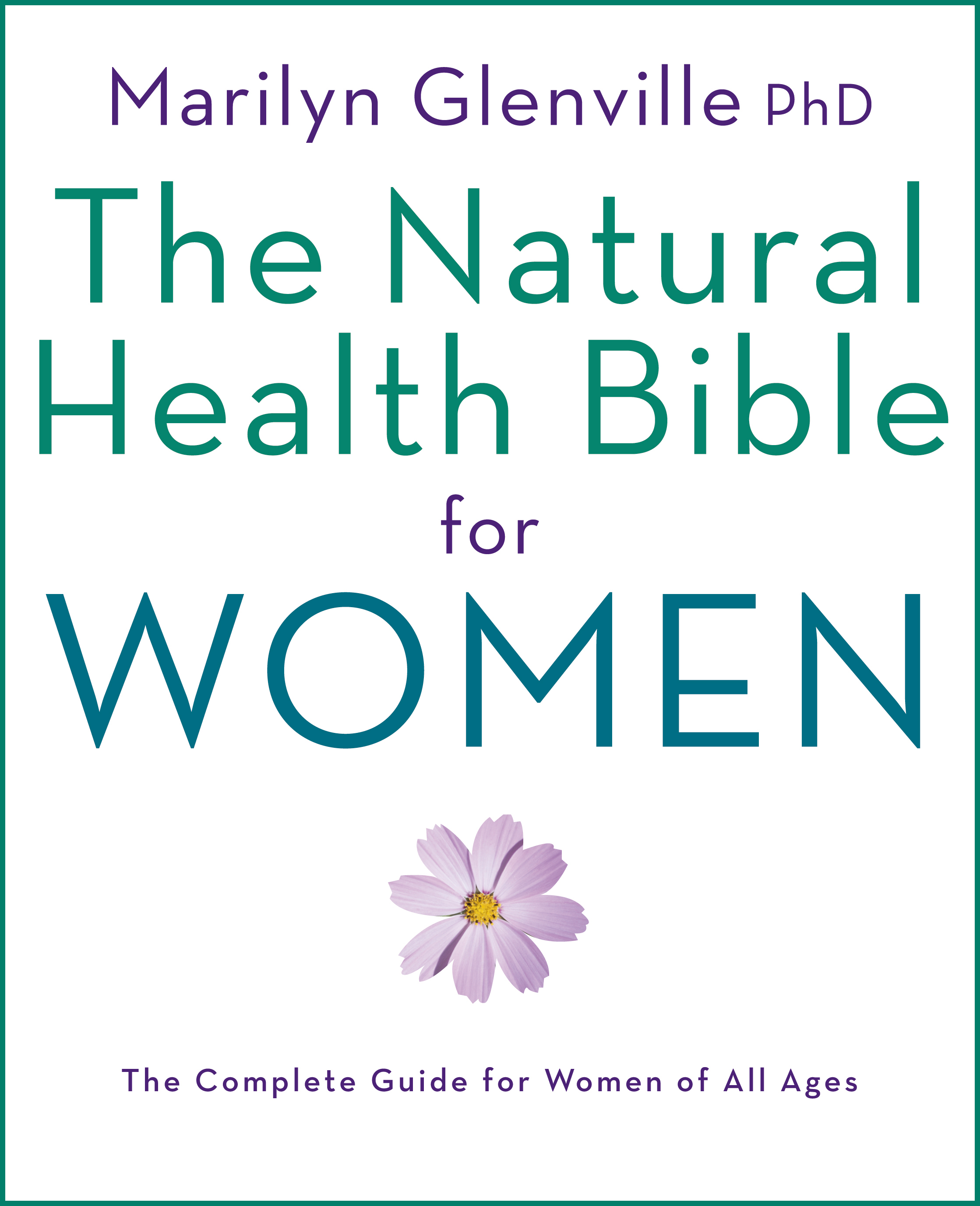Miscarriage

It may seem a callous approach, but the reason for this response is simply that miscarriage is extremely common. In fact, one in four pregnancies end in miscarriage, usually before the twelfth week of pregnancy. Many women miscarry without having been aware that they were pregnant. Nevertheless, if you do suffer a miscarriage, no amount of reassurance that it is ‘normal’ or ‘common’ can ease the pain.
What is a miscarriage?
A miscarriage, which is also known as ‘spontaneous abortion’, occurs when a baby (foetus) is lost spontaneously before the 24th week of pregnancy. After this time, the death of a baby is called a ‘stillbirth’.
Many women feel well and will not notice anything untoward before a scan confirms that the baby has stopped developing and died. In this situation, the miscarriage is called a ‘missed abortion’ because the baby has died, but has not been expelled from the womb. In some cases, a fertilised egg will not have developed, or developed poorly. On a scan, this would show as a pregnancy, but there would be no embryo because the foetus will have stopped growing early on. This is known as a ‘blighted ovum’. Unfortunately, you may not know anything is wrong until you have the first routine scan, which is a great shock to an expectant mother.
What are the symptoms?
In the case of a threatened miscarriage, where the risk of losing your baby is increased, you may experience:
- bleeding from the vagina, often containing clots
- blood in the vaginal mucus
- abdominal pain and/or cramping
- back pain
What are your choices?

You may be concerned that because nothing has changed between one miscarriage and the next pregnancy, there is a possibility that it could happen again.
It is believed that up to 50 percent of miscarriages are due to a chromosomal abnormality. Only a small portion of chromosomal abnormalities are inherited and you can be tested (screened) to see if there is a problem that needs to be addressed. Other chromosomal abnormalities occur before, during and after fertilisation, as the chromosomes divide. For this reason, it is extremely important that both you and your partner are in optimum health before you conceive in order to make sure that the egg and sperm are as healthy as possible before fertilisation.
You can achieve optimum health and minimise the risk of a miscarriage by following the recommendations below.
The natural approach to miscarriage, particularly when there is no medically diagnosed cause, has proved to be very effective. A study conducted by the University of Surrey showed that 83 percent of couples, with a previous history of miscarriage, who made changes in their lifestyle, diet and took nutritional supplements, conceived and had a baby within the three years of the study without experiencing another miscarriage. The national average for miscarriages is 1 in 4, so one would have expected to see some miscarriages, especially in those couples who had already experienced a miscarriage. However, none of the couples who became pregnant during the study suffered a miscarriage. Those statistics speak for themselves.
It takes at least three months for immature eggs (oocytes) to develop to maturity. At this point they are ready for ovulation. As a result, there is a four-month period in which you can take steps to ensure that all of the factors necessary for a healthy conception and pregnancy are present. This is called the preconceptual period, and it is essential that you look upon this period as one that is as important as the pregnancy itself in terms of your lifestyle and diet. It also takes at least three months for sperm cells to mature, ready to be ejaculated, so your partner needs to follow the recommendations below over four months as well.
So take four months off. Don’t even try to conceive over that time and spend those months achieving optimum health before you try to get pregnant again. Make sure that you and your partner have corrected any vitamin and mineral deficiencies and that toxins (for further information about toxins, see how to access the full chapter on Miscarriages below) are avoided as much as possible.
Your diet will be supplemented in order to ensure that both you and your partner have all the nutrients required to create healthy eggs and sperm. Below you’ll also find nutrients that are vital for preventing miscarriage.
Supplements

Multivitamin and Mineral
A good quality multivitamin and mineral would form the foundation of your supplement programme to make sure that you are getting a ‘little bit of everything’. You then add in those nutrients in slightly higher amounts which are known to be helpful in preventing miscarriages.
Folic Acid
Any woman trying to become pregnant now knows about the importance of folic acid, which has been proven to prevent spina bifida. What you may not know is that it is extremely important for women who experience miscarriage.
Research into heart disease suggests that folic acid and vitamin B12 might be beneficial in controlling an amino acid called homocysteine that is found in the blood. In high quantities, homocysteine causes damage to the lining of the blood vessels. Interestingly, high levels of homocysteine have also been found in women who experience recurrent miscarriages. It is, therefore, important that both folic acid and vitamin B12 form a part of your supplement plan.
Vitamin E
Aspirin and heparin are given to women who have blood clotting antibodies in order to thin the blood. Another possibility – and certainly the natural alternative – is to take vitamin E. This vitamin can help thin the blood and prevent clots. A study published in the Lancet found that taking a daily dose of vitamin E reduced the risk of having a heart attack by an astonishing 75 percent. The scientists heading this study commented that the results were even more ‘exciting than aspirin’.
Zinc
Zinc is an essential component of genetic material and a zinc deficiency can cause chromosome changes in both partners, leading to an increased risk of miscarriage. Zinc is found in high concentrations in the sperm, and adequate levels are needed to make the outer layer and tail. It’s fairly obvious that it is a crucial nutrient for healthy sperm.
What’s more, zinc plays a vital role in normal cell division, so it is particularly important that adequate levels are available at the time of conception in order to prevent a miscarriage.
Selenium
Researchers have found that women who miscarry have low levels of selenium in their blood compared to women who don’t miscarry. Selenium is a powerful antioxidant and it can prevent chromosome breakage and DNA damage, which are known to be a cause of miscarriages and birth defects.
Selenium is also needed for healthy sperm formation, so I strongly suggest that your partner supplements with selenium if the semen analysis shows a high percentage of abnormal sperm. As an antioxidant, selenium can also protect against possible DNA damage to sperm.
Co-Enzyme Q10
This is a vitamin-like substance that is contained in nearly every cell of the body. It is important for energy production and normal carbohydrate metabolism (the way the body breaks down the carbohydrates you eat in order to turn it into energy).
Research shows that women with low levels of co-enzyme Q10 are at an increased risk of miscarriage, because good levels prevent the womb from contracting abnormally.
As co-enzyme Q10 is an antioxidant it can be extremely helpful for sperm cells to protect membranes from free radical damage so would be suggested for men who have a higher proportion of abnormal sperm or high DNA sperm damage which can lead to a miscarriage.
Because of its role in energy production it is also a significant nutrient for men if sperm motility is poor. Co-enzyme Q10 is concentrated in the area between the head and tail of the sperm; the energy for movement and all other energy-dependent processes in the sperm cell depend on it. Lower levels of co-enzyme Q10 have been found in men with poor sperm and supplementing with this nutrient has led to a significant improvement.
Omega 3 Fatty Acids
These essential fats have a profound effect on every system of the body, including the reproductive system and they are crucial for healthy hormone functioning, help to prevent abnormal clotting and to control inflammation which may cause a miscarriage. For men essential fatty acid supplementation is crucial because the semen is rich in prostaglandins which are produced from these fats. Men with poor sperm quality, abnormal sperm, poor motility or low count, have inadequate levels of these beneficial prostaglandins.
Many of the women I see in the clinic have been taking evening primrose oil supplements – an Omega 6 fatty acid – for years and have not been eating enough Omega 3 oils, or taking them in supplement form, to counterbalance this. Some women are also taking combinations such as Omega 3, 6, and 9 in supplement form because they have heard that we need a good balance of all the Omega fatty acids. This is true, but you have to take into account what your own levels may be in the first place. It is no good adding in more Omega 6 if you have already got enough or in fact too much in your body. (You can now have a blood test to tell you if you have the correct levels of Omega 3 to Omega 6 in your body see below). To check whether you have sufficient levels of Omega 3 please click Omega 3 Deficiency Test (at home finger prick blood)
Vitamin D
There is an increasing wealth of research linking low levels of this vitamin with miscarriage. It’s thought that Vitamin D plays a role in helping the body to maintain a pregnancy and overcoming problems with your immune system which may make it difficult to stay pregnant. So if you’ve had a miscarriage, it is recommended that you check your levels. To check whether you have sufficient levels of Vitamin D please click Vitamin D Deficiency Test (at home finger prick blood)
Herbs

Agnus Castus (Vitex agnus castus)
This is a very helpful remedy for women who experience miscarriage because of a luteal phase defect (shortened second half of the cycle) or insufficient progesterone levels. It stimulates the function of the pituitary gland, which controls and balances our hormones by producing luteinising hormone. This increases progesterone production and helps regulate a woman’s cycle.
In one study on women with corpus luteum deficiency, 25 out of the 35 women normalised their serum progesterone levels after three months of taking agnus castus.
For other herbs to help prevent a miscarriage, see the rest of the Understanding Miscarriage ebook at The Natural Health Practice which you can download.
Caution
You should not take any of the above herbs if you are taking, The Pill, Fertility drugs, HRT or any other hormonal treatment or other medication unless they are recommended by a registered, experienced practitioner.
Tests

Mineral Deficiency Test with Supplement Programme (hair)
Find out what the mineral and heavy toxic levels are in your body
This test measures the deficiencies and excess levels of 12 different minerals (including calcium, chromium, cobalt, copper, iron, magnesium, manganese, phosphorus, potassium, selenium, sodium and zinc) and 6 heavy toxic metals (including aluminium, arsenic, cadmium, lead, mercury and nickel) that may be present in your body. Find out more – Mineral Deficiency Test with Supplement Programme (hair)
Online Personalised Supplement Assessment Programme
Discover what vitamins and minerals you need and should be taking
The analysis of this comprehensive questionnaire will give you a three monthly supplement programme to help balance any vitamin and mineral deficiencies you may have. Find out more – Online Personalised Supplement Assessment Programme
Omega 3 Deficiency Test (at home finger prick blood)
If you want to find out if you are getting enough Omega 3 fatty acids from your diet and whether you have the correct balance of essential fatty acids.
Signs of an Omega 3 fatty acid are dry skin, lifeless hair, cracked nails, fatigue, depression, dry eyes, lack of motivation, aching joints, difficulty in losing weight, forgetfulness, breast pain. If you have also tried to lose weight by going on a low-fat or no-fat diet, you are likely to be deficient in these essential fats. It is now estimated that we are getting ten times more Omega 6 fats from our diet than Omega 3 and over the last century there has been an 80% decrease in the consumption of these Omega 3 fatty acids. When you eat Omega 3 fats they are converted to substances that have an anti-inflammatory effect on the body.
Many of the women I see in the clinic have been taking evening primrose oil supplements – an Omega 6 fatty acid – for many years as it can be helpful with PMS. But you can end up with too much Omega 6 and not enough Omega 3 in your body. Some women are also taking combinations such as Omega 3, 6, and 9 in supplement form because they have heard that we need a good balance of all the Omega fatty acids. This is true, but you have to take into account what your own levels may be in the first place. It is no good adding in more Omega 6 if you have already got enough or in fact too much in your body. (You can now have a blood test to tell you if you have the correct levels of Omega 3 to Omega 6 in your body see below). To check whether you have sufficient levels of Omega 3 please click Omega 3 Deficiency Test (at home finger prick blood)
Female Hormone Test (saliva)
Are your hormones in balance?
This is a very simple test that is done at home and then sent to the lab for analysis. A total of 12 saliva samples are collected over one cycle at specific times. The level of the hormones oestrogen and progesterone are mapped for that month to provide a pattern that can show whether you have problems maintaining progesterone levels or whether you have a very short luteal (second half) phase of the cycle, which can make it difficult to stay pregnant. Find out more – Female Hormone Test (saliva)
Infection Screen (urine)
Find out if an infection is stopping you staying pregnant
Infections in the vagina may have a serious impact on your ability to conceive and to hold on to a pregnancy. These infections may have existed for many years with low activity and often present no symptoms. If you are having problems conceiving or have suffered from successive miscarriage or IVF failure or if you have a persistent vaginal secretion it may be worth considering having an Infection Screen.
Infections in the prostate gland may affect both the quantity and quality of the sperm, so an infection screen is advisable, especially if everything else has been ruled out.
It is advisable to get this organised at a specialist clinic like my one as the NHS infection screens can be very basic. Find out more – Infection Screen (urine)
Vitamin D Deficiency Test (at home finger prick blood)
With all the news in the press about the benefits of having good levels of vitamin D e.g. prevention of cancer, especially breast cancer, heart disease, Type 2 diabetes and osteoporosis it is important that you know whether or not you are lacking in this vital vitamin.
We know that Vitamin D is required for calcium absorption, but it also plays many other important roles including prevention of cancer, especially breast cancer, heart disease, Type 2 diabetes and osteoporosis. As well as all of these benefits, it is now thought that having good levels of vitamin D can help slow down the ageing process and low levels have been implicated in other autoimmune diseases such as rheumatoid arthritis, lupus and inflammatory bowel disease. To check whether you have sufficient levels of Vitamin D please click Vitamin D Deficiency Test (at home finger prick blood)
After three months you would then have a re-test in order to monitor your progress and adjust your supplement programme according to your new condition.
If you need help in obtaining any of the supplements, herbs or tests mentioned above, click, Miscarriage options at The Natural Health Practice. They can supply all of them for you online or if you prefer to talk to somebody first you can also order by mail order on the telephone. The products supplied by this company are always of the highest quality.
Plan of Action
Nutrition
Ensure you are getting the right nutrition. Follow the dietary recommendations outlined in the free Foundation of Health ebook. For more information on the special dietary recommendations for miscarriage, read the rest of the Understanding Miscarriage ebook at The Natural Health Practice
Supplements
The supplement programme below should be taken for at least three months in order to achieve best results
Nutrients & amounts
| A good multi-vitamin & mineral supplement | must contain 400µg of folic acid | Co-enzyme Q10 | 50mg |
| Zinc citrate | 30mg | Vitamin C with bioflavonoids | 1000mg |
| Selenium | 100µg | Omega 3 fish oils | (providing 770mg EPA and 510mg DHA) |
| Vitamin E | 161mg |
To avoid having to purchase numerous supplements for all of the above and to make the process easier, I have put together a supplement programme which contains all the nutrients mentioned above and in the correct dosages. For more information about these click Miscarriage Supplement Programme.
In my book ‘Getting Pregnant Faster’ I explain the impact of nutrition on miscarriage and also give in great detail a list of the most important nutrients and herbs required in order to help you.
If you would like to order these special supplements now, you can do so through the Natural Health Practice by clicking Miscarriage Supplements at the Natural Health Practice.
| At the end of three months you should reassess your condition and adjust your supplement programme accordingly. |
Tests
The tests below have been specially selected to be the most helpful if you are concerned about miscarriage.
Mineral Deficiency Test with Supplement Programme (hair)
Online Personalised Supplement Assessment Programme
Omega 3 Deficiency Test (at home finger prick blood)
Vitamin D Deficiency Test (at home finger prick blood)
After three months you would then have a re-test in order to monitor your progress and adjust your supplement programme according to your new condition.
If you need help in obtaining any of the supplements, herbs or tests mentioned above, click, Miscarriage options at The Natural Health Practice. They can supply all of them for you online or if you prefer to talk to somebody first you can also order by mail order on the telephone. The products supplied by this company are always of the highest quality.
Read More

At the end of the ebook is a practical step by step summary of what you can do to help yourself.
If you would like to read the rest of this ebook click, Understanding Miscarriage ebook at The Natural Health Practice and you will be given details of how you can download the whole ebook.

The contents of this site are for information only and are intended to assist readers in identifying symptoms and conditions they may be experiencing. This site is not intended to be a substitute for taking proper medical advice and should not be relied upon in this way. Always consult a qualified doctor or health practitioner, especially if you are pregnant, taking the pill or on any medication. Your situation will need to be looked at individually and you should not attempt to self treat. The author and publisher cannot accept responsibility for illness arising out of the failure to seek medical advice from a doctor.
The views expressed by third parties placing material on these pages are not representative of the views of the author or publisher. The Author and Publisher cannot monitor the content not produced by us and has not reviewed all the third party material published on this site and the Author and Publisher accept no liability whatsoever in relation to the content of third party material placed on these pages.

